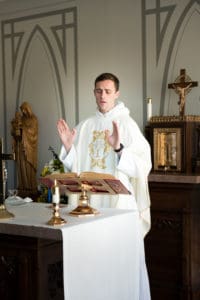Icon Rich in Splendor: Life of St. Thomas Aquinas
Posted on Tuesday, February 13, 2018

This homily was delivered at the January 25 Mass offered at St. Jude Chapel in honor of the College’s patron, St. Thomas Aquinas.
By Rev. Gregory Pine, O.P.
Saint Thomas Aquinas has an elusive personality. What with a modest bearing and a medieval method, Saint Thomas’s work lacks the peculiar flair that one might hope to find therein. For all his voluminous output, rarely do we find humorous aside, satirical whimsy, or personal anecdote. Rather, one is led to believe that Saint Thomas was simply an intellectual machine, a monster of erudition who produced Christendom’s finest theology at a rate of nearly fifteen pages a day, a man of hulking frame and abstracted countenance forever engrossed in the incomprehensible. With an ability to make first-impressions of such like, it’s no wonder many consider him boring. But this reading decidedly misses the point, for to appreciate his personality we oughtn’t look for it in quips or cracks. Rather by attending to Saint Thomas on his own terms, his personality shines through in precisely the place it ought—in his life—and specifically in his life as the verification of and testimony to his work. For Saint Thomas Aquinas was truly conformed to the realities about which he read, disputed, and preached.
Consider one sense in which we see this borne out: As a Dominican friar and heir to the Holy Preaching of Toulouse, Saint Thomas was especially preoccupied by the question of evil: it forms the principle objection to the existence of God in the Prima Pars of the Summa Theologiae, Question 2, article 3; it demands considerable attention in the famous treatise on creation; and it constitutes the subject matter of one his longest Quaestiones disputatae.
Good, Saint Thomas teaches, is convertible with being; while evil is a privation thereof. Thus the good always has pride of place and the last word; it possesses a kind of cosmic priority. What is more, evil does not represent a failure in the divine plan. The providence of God is such that nothing falls without its bounds, nor can it be frustrated by any secondary or instrumental cause. God is neither defeated nor scandalized by evil. Finally, God permits no evil to befall except he can bring from it some greater good. Each Easter Saint Thomas sings the Exsultet with full-throated approbation: “O Happy Fault!” Here we have the settled conviction of the Angelic Doctor, but how did it touch his own life?

Saint Thomas, we know, was born to a noble family. One of nine children, he was set aside from a young age for an ecclesiastical career. His parents hung on him their hopes of feudal and political advancement and promoted him as the next abbot of Monte Cassino. At the age of 5, Thomas was entrusted to the [Benedictine] monks as a boy oblate. Saint Thomas lived in the monastery for some 11 years, until, at the age of 16, he was forced to leave the monastery when Frederick II invaded the monastery lands. From there, he moved to Naples to finish a degree in liberal arts. There he met the [Dominican] friars and was captivated by the God whom they contemplated and preached. Thomas resolved to join the friars and was almost successful until his parents got word; they could not abide his intention to take up with a religious movement which was as yet untested and lacking in distinction. And so, like any normal southern Italian family, they kidnapped him and placed him under house arrest until such time as he should wise up. Saint Thomas’s perseverance tried their patience, and so, his brothers devised a plan to expedite the process. A grave sin, they reasoned, would put an end to his idealistic aspirations; and so they introduced a temptress into his room to set the stage for a fall from grace.
Here we pause to take in what, by all accounts, is a pretty desolate landscape—an evil state of affairs. Saint Thomas had frustrated his family’s plans for political advancement. They, in turn, had frustrated his plans for religious perfection. He has, in a certain sense, failed in his life and vocation. And he is perilously close to failing in virtue.
But here the personality blazes forth—at once terrible and good. Saint Thomas, we are told, took a brand from the fire, courteously conveyed the woman from his quarters, and scorched a cross on the door, returning to his bedside to pray.
Behold the saint in midst of evil—misunderstood, stymied, betrayed, but not confounded—and thereby he testifies that all that he wrote, disputed, and preached is true—universally and existentially—true. So though he be failed vassal, lapsed Benedictine, and fragile innocent, in his very person the evil that befalls is somehow transformed in God’s providence and turned to profit. No, he did not advance his family’s political aims, but his sanctity accorded greater dignity to those of his stock than any ever ascribed to Guelf or Ghibelline. No, he never returned to Monte Cassino, but his teaching went on to vindicate the religious and apostolic life against some of its most venomous and vehement detractors. And though the cloister would have spared him the encounter with the temptress, yet by his victory, his chastity was fortified and made fruitful for generations yet to come.
As the verification of and testimony to his work, Saint Thomas’s life is an icon rich in splendor. Like his precious Savior before him, Saint Thomas bore in his life the very substance of his teaching. In Saint Thomas, the patron of your college, you have an intercessor who is no mere peddler in abstractions, but a saint, one who has been tried and not found wanting. Those who turn to him in need do not come away empty-handed, but rather emboldened by the encounter with one who has taught and suffered the truth and who has expended himself in its service. So whatever trial befall, Saint Thomas will not be confounded, nor shall you.
